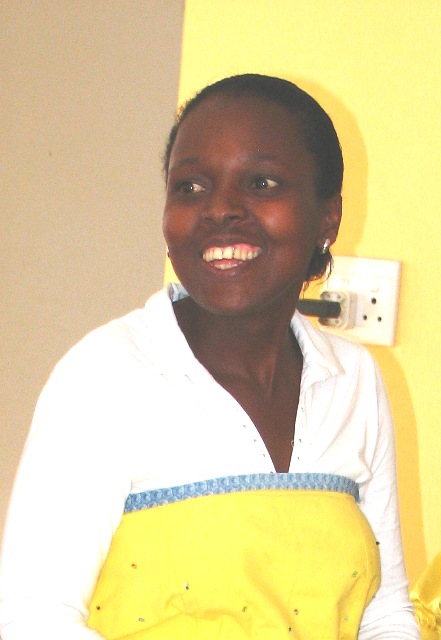8th April, 2009
Umzimkhulu is one of the most disadvantaged of all areas of South Africa. Levels of water provision by government are unacceptably low, with 80% of the community within this project still using unprotected open water sources. In addition, the recent base line survey shows that hygiene and sanitation practices are equally appalling, and health knowledge is negligible, with only 18% of the community having a good knowledge of 6 health topics. The combination of poor facilities, poor hygiene and poor knowledge is causing high levels of infectious diseases : diarrhoea from unsafe food and water, skin diseases from lack of washing and worm infestations which inhibit child growth and damage levels of achievement at school. However change is in the air. In ten wards of Umzimkhulu communities are stirring and wakening from their sleep. In January 2009, Community Health Clubs were started in nine out of the ten projected Wards, and there are now a total of 883 members. Given an average of 5.4 persons per household this means there are already 4,768 direct beneficiaries of this project. From past experience we know the diffusion of information from each member extends to neighbours who often change their hygiene habits due to peer pressure even if they do not become a CHC member and attend the health club sessions. Therefore it can be assumed that the impact of the project will be on over 10,000 indirect beneficiaries.
In the first two months since mobilisation started in February 2009, there has been a good response to the project. As hoped the average size of a health club in Umzimkhulu is 98 members per club, with the largest club being in Ward 4 with 144 members. However the size of the club does not always mean that it is the most effective club, as large clubs can merely reflect a more dense population or be because people in some areas are more prone to hope to receive something, but may not continue to attend if there are no handouts. The success of a club will depend on the number of active members who attend regularly, not just those who are registered. The most accurate measurement of a successful facilitator is that of average attendance for each session, because this shows that members continue to find their sessions interesting and worth attending. Ward 15 and Ward 18 have equally the highest attendance rates (both at 60%) whilst the lowest is Ward 8 with only 23% attendance.

Five facilitators have done four sessions at their clubs, whilst the remaining have done two or three sessions. Only one facilitator has failed to form a club in Kwa Gijima (Ward 17) which was one of the villages selected as a case study. Her failure to conduct any sessions after two months has resulted in the Project Steering Committee requesting her counselor to find a replacement facilitator. As this project is attempting to use community members rather than trained health personnel as facilitators in an effort to ensure sustainability and build capacity at the grass roots, it is inevitable that there will be some poorly chosen facilitators who do not have the capacity for the job required. However we are delighted that 90% of the facilitators are coping well, although they need considerably more training and support than is normal when NGO or government Environmental Health staff are used as CHC facilitators. Normally when higher educated staff are facilitators Africa AHEAD provides a one-off training workshop at the beginning of the programme. However in Umzimkhulu, most selected facilitators have only a basic education,and therefore need more regular support. A full time Project Manager and Project Officer are on site and provide continual top-up training and monitoring as needed. Monthly training sessions provide support for facilitators who are taught the next four sessions for the forthcoming month.
The facilitator of the month is Buyisiwe Majola from Ward 13, who has shone out this month for her enthusiasm and hard work. She has registered 96 members, and conducted 205 surveys. While some facilitators are battling to visit all their members homes, she has completed not only the base-line household inventory but is now on the second round of household visits checking on whether there have been any changes within the past two months. Her health club, named Zibambele has 96 members, and she has conducted the four sessions as instructed. Other facilitators are also doing well, particularly Gladys Mkhise, who has successfully galvanised her community into action, surprising people with her energy and ability to mobilise, dispite being a pensioner. She says, ‘One is never too old to learn or contribute to the well being of one’s community.’ The slogan her members have adopted ‘Vukamawulele!’ means ‘Rise up from your sleep!’
| Facilitators | Club Name | Members | Sessions | Avg Attendance per Session | H/hold Obs Completed | ||
| Name | Surname | Ward | |||||
| Nomawethu | Thusi | 2 | Siyakhulu | 82 | 2 | 37% | 76 |
| Gladys | Mkhise | 4 | Sakhisizwe | 149 | 4 | 34% | 119 |
| Nomhle | Dlamini | 5 | Buhlebezwe | 104 | 4 | 55% | 111 |
| Patience | Njobe | 6 | Hlanganani | 66 | 5 | 52% | 42 |
| Nomfanelo | Phumlomo | 7 | Masikani | 102 | 4 | 37% | 83 |
| Nolwazi | Mdlozini | 8 | Vukuzakhe | 122 | 4 | 23% | 38 |
| Buyisiwe | Majola | 13 | Zibambele | 96 | 4 | 43% | 205 |
| Thembinkosi | Mbenste | 15 | Masizakhe | 86 | 2 | 60% | 43 |
| Ncediswa | Mbokazi | 18 | Siyazinzela | 76 | 2 | 60% | 38 |
| TOTALS |
883 |
27 | 43% | 755 | |||
